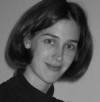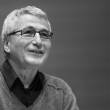Invités
Joelle Pineau
- Date : Lundi 1er juillet
 Joelle Pineau est professeur au School of Computer Science de l'Université McGill à Montréal, où elle co-dirige le Reasoning and Learning Lab. Elle a obtenu en 2004 un PhD de la Carnegie Mellon University. Sa recherche porte principalement sur le développement et l'analyse d'algorithmes d'apprentissage automatique et de prise de décision, avec application de ces techniques en robotique mobile et dans les systèmes médicaux intelligents.
Joelle Pineau est professeur au School of Computer Science de l'Université McGill à Montréal, où elle co-dirige le Reasoning and Learning Lab. Elle a obtenu en 2004 un PhD de la Carnegie Mellon University. Sa recherche porte principalement sur le développement et l'analyse d'algorithmes d'apprentissage automatique et de prise de décision, avec application de ces techniques en robotique mobile et dans les systèmes médicaux intelligents.
- Titre : L'apprentissage automatique au service de la robotique sociale
- Résumé : Le déploiement de robots mobiles dans des environnements humains est en plein essor. La première génération de tels produits (e.g. robots aspirateurs) démontre des habiletés sociales fort limitées. La prochaine génération, incluant des robots-companions et assistants, devra faire preuve de plus de civisme dans ses interactions avec les humains, y compris une meilleure capacité de communiquer, et de partager l’espace de navigation de façon efficace. Cette présentation donnera un aperçu du projet de fauteuil roulant intelligent initié conjointement entre l'Université McGill, l'Ecole Polytechnique de Montréal et l'Ecole de réadaptation à l'Université de Montréal. Je me pencherai plus particulièrement sur les approches d'apprentissage automatique qui sont intégrées dans le système pour permettre une interaction efficace entre le fauteuil intelligent et son environnement. Je présenterai de nouvelles méthodes d'apprentissage par imitation qui ont été développées pour permettre à des robots sociaux de se déplacer de façon fluide et naturelle dans des foules. Je discuterai aussi de l'utilisation de méthodes d'apprentissage par renforcement bayésien pour développer un protocole de dialogue efficace et robuste à partir de peu de données. Finalement, je donnerai un aperçu de l’impact de ces travaux à long terme sur le développement d’une nouvelle génération de robots sociaux.
Hans van Ditmarsch
- Date : Mardi 2 juillet
 Hans van Ditmarsch obtained a PhD at the University of Groningen in 2000. He lectured at the University of Otago from 2001-2007 and remained affiliated to that university until 2010. In 2007-2008 he was a CNRS researcher at IRIT (Institut de Recherche en Informatique de Toulouse) and in 2008 a Lorentz Fellow at NIAS (Netherlands Institute for Advanced Study in the Humanities and the Social Sciences). In 2009 he joined the University of Sevilla as a senior researcher on a five year (2009-2014) project on unconditionally secure protocols. From 2010-2016 he is an associated researcher at IMSc (Institute of Mathematical Sciences), Chennai. December 2012 he joined LORIA (Laboratoire Lorrain de Recherche en Informatique et ses Applications), Nancy, as a senior researcher. His research is on the dynamics of knowledge, information-based security protocols, modal logics for belief revision, proof tools for epistemic logics, combinatorics, and computer and information science education.
Hans van Ditmarsch obtained a PhD at the University of Groningen in 2000. He lectured at the University of Otago from 2001-2007 and remained affiliated to that university until 2010. In 2007-2008 he was a CNRS researcher at IRIT (Institut de Recherche en Informatique de Toulouse) and in 2008 a Lorentz Fellow at NIAS (Netherlands Institute for Advanced Study in the Humanities and the Social Sciences). In 2009 he joined the University of Sevilla as a senior researcher on a five year (2009-2014) project on unconditionally secure protocols. From 2010-2016 he is an associated researcher at IMSc (Institute of Mathematical Sciences), Chennai. December 2012 he joined LORIA (Laboratoire Lorrain de Recherche en Informatique et ses Applications), Nancy, as a senior researcher. His research is on the dynamics of knowledge, information-based security protocols, modal logics for belief revision, proof tools for epistemic logics, combinatorics, and computer and information science education.
- Titre : Awareness and Knowledge
- Résumé : Modal logics of knowledge model uncertainty. Logics of awareness model incompleteness (as in vocabulary restriction) - a topic considered of great interest in economics. I have been working on these matters with Tim French (Perth), Fernando Velazquez (Sevilla), and Yi Wang (Bergen). We compare different epistemic notions in the presence of awareness of propositional variables: the logics of implicit knowledge (in which explicit knowledge is definable as implicit knowledge plus awareness), explicit knowledge, and speculative knowledge. Speculative knowledge goes back to the motivation in Levesque's 'A Logic of Implicit and Explicit Belief': one can speculate over variables of which one is unaware, e.g. if you are unaware of p, then p v ~p is still speculatively known by you. A cornerstone of this framework is the notion of awareness bisimulation - this is the proper notion of structural similarity on the structures enriched with awareness of propositional variables proposed by Fagin and Halpern in 'Belief, awareness, and limited reasoning'. A more 'standard' sort of bisimulation is also suitable for these logics. We provide correspondence between bisimulation and modal equivalence on image-finite models for these logics. The logic of speculative knowledge is equally expressive as the logic of explicit knowledge, and the logic of implicit knowledge is more expressive than both. The logics have complete axiomatizations. Dynamics can also be added: any conceivable change of knowledge or awareness can be modelled in this setting. The dynamic versions of all three logics are, surprising, equally expressive.
Franco Zambonelli
- Date : Mercredi 3 juillet
 Franco Zambonelli is full professor of Computer Science at the University of Modena and Reggio Emilia. He got his PhD in Computer Science and Engineering from the University of Bologna in 1997. His research interests include: pervasive computing, multi-agent systems, self-adaptive and self-organizing systems. He is the co-Editor in Chief of the ACM Transactions on Autonomous and Adaptive Systems, and he is in the Editorial Board of the Elsevier Journal of Pervasive and Mobile Computing, of the BCS Computer Journal and of the Journal of Agent-Oriented Software Engineering, and he is in the Steering Committee of the IEEE SASO Conference.
Franco Zambonelli is full professor of Computer Science at the University of Modena and Reggio Emilia. He got his PhD in Computer Science and Engineering from the University of Bologna in 1997. His research interests include: pervasive computing, multi-agent systems, self-adaptive and self-organizing systems. He is the co-Editor in Chief of the ACM Transactions on Autonomous and Adaptive Systems, and he is in the Editorial Board of the Elsevier Journal of Pervasive and Mobile Computing, of the BCS Computer Journal and of the Journal of Agent-Oriented Software Engineering, and he is in the Steering Committee of the IEEE SASO Conference.
- Titre : Engineering Socio-technical Urban Superorganisms
- Résumé : Progresses in mobile and ubiquitous computing are paving the way for innovative services to perceive detailed information about the surrounding world and interact with it. In addition, social networks are promoting innovative models and tools to engage people in situated collaboration activities. In urban scenarios, these factors let us envision the possibility of integrating the complementary sensing, computing, and actuating capabilities of ICT devices and of humans to realize a number of innovative services. This could result in an immense number of inter-connected organisms working in an orchestrated and self-organizing way to achieve specific urban-level goals, as if they were a single organism, i.e., what in biology is usually called a “superorganism”. In this talk, I will sketch the future vision of urban super-organisms and identify the key challenges in engineering innovative urban services that seemingly involve ICT devices and humans, and that harnessing the power of pervasive social intelligence to improve the quality and sustainability of our urban environments. In particular, I will discuss how the lessons of bio-inspired computing can be a promising starting points for the engineering of urban superorganisms, but also requires synthesizing lessons from socially-inspired computing models. I will also present my personal experience in the context of the SAPERE (“Self-aware Pervasive Service Ecosystems”) European project, and will sketch directions for future research.
Serge Abiteboul
- Date : Jeudi 4 juillet
 Serge Abiteboul a obtenu un Ph.D. de l'University of Southern California et une Thèse d'État de l'Université Paris-Sud. Il est chercheur à l'Institut National de Recherche en Informatique et Automatique depuis 1982. Il a été Maître de conférences à l'École polytechnique et Professeur invité à Stanford et Oxford University. Serge Abiteboul a reçu en 1998 l'ACM SIGMOD Innovation Award et est membre de l'Académie des Sciences depuis 2008. Il est à présent membre du LSV à l'École Normale Supérieure de Cachan et a obtenu en 2008 une ERC Advanced Grant. Sa recherche porte principalement sur la gestion d'information, notamment sur le Web.
Serge Abiteboul a obtenu un Ph.D. de l'University of Southern California et une Thèse d'État de l'Université Paris-Sud. Il est chercheur à l'Institut National de Recherche en Informatique et Automatique depuis 1982. Il a été Maître de conférences à l'École polytechnique et Professeur invité à Stanford et Oxford University. Serge Abiteboul a reçu en 1998 l'ACM SIGMOD Innovation Award et est membre de l'Académie des Sciences depuis 2008. Il est à présent membre du LSV à l'École Normale Supérieure de Cachan et a obtenu en 2008 une ERC Advanced Grant. Sa recherche porte principalement sur la gestion d'information, notamment sur le Web.
- Titre : From data and information to knowledge: the Web of tomorrow
- Résumé : Relational database management systems serve as mediators between individuals and machines. They are among the greatest successes of computer science in the last century. Web search engines brought information management to levels that were previously unconceivable before. Then, after Internet and networks of machines, after the Web and the network of content, came the time of networks of Internet users. Social networks enable computer users to communicate, publish, and interact with others leading to new modes of thinking, new kinds of relations. With the increase in the volume of data and information they provide, a collective intelligence is currently emerging. One of the main challenges for the coming years is the development of technologies that will make it possible to find, evaluate, validate, verify and rank information, and thus build tomorrow’s “Web of knowledge”. By considering evolutions of the Web, we will try to imagine that world with billions of computer systems connected, collectively reasoning to help Internet users survive in an ocean of data and information.
- Présentation : PDF
Antoine Bordes
- Date : Vendredi 5 juillet
 Antoine Bordes est Chargé de Recherche CNRS dans le laboratoire Heudiasyc de l'Université de Technologie de Compiègne. En 2010, il était chercheur contractuel à l'Université de Montréal. Il a obtenu son doctorat en Informatique à l'Université Pierre et Marie Curie en 2010. Financée par la Délégation Générale pour l'Armement (DGA), sa thèse, qui portait sur l'apprentissage automatique, a été préparée au LIP6 (avec des séjours réguliers à NEC Labs of America à Princeton aux Etats-Unis). Il a reçu les prix de la meilleure thèse remis par l'AFIA et par la DGA. Ses recherches actuelles portent principalement sur la manipulation de grandes masses de données, avec des applications au traitement du langage naturel.
Antoine Bordes est Chargé de Recherche CNRS dans le laboratoire Heudiasyc de l'Université de Technologie de Compiègne. En 2010, il était chercheur contractuel à l'Université de Montréal. Il a obtenu son doctorat en Informatique à l'Université Pierre et Marie Curie en 2010. Financée par la Délégation Générale pour l'Armement (DGA), sa thèse, qui portait sur l'apprentissage automatique, a été préparée au LIP6 (avec des séjours réguliers à NEC Labs of America à Princeton aux Etats-Unis). Il a reçu les prix de la meilleure thèse remis par l'AFIA et par la DGA. Ses recherches actuelles portent principalement sur la manipulation de grandes masses de données, avec des applications au traitement du langage naturel.
- Titre : Traiter de grandes masses de données relationnelles grâce à l'apprentissage automatique.
- Résumé : D'innombrables quantités de données complexes peuvent êtres représentées comme des graphes dont les nœuds représentent les concepts mis en jeu et les arcs les relations entre eux. Ces données, communément appelées données relationnelles (ou “relational data”), sont au cœur de nombreux systèmes de gestion de l'information en bio-informatique, fouille de données ou marketing par exemple. Cette présentation va traiter de deux directions de recherche concernant ces données qui sont actuellement en plein essor. En premier lieu, comment manipuler (c'est-à-dire résumer visualiser, fusionner, réparer) aisément ces bases de données, sachant que leurs dimensions peuvent être énormes, et que la qualité de leurs données peut être incertaine ? En second, comment organiser automatiquement des données non-structurées dans de tels schémas ? Ces problématiques seront illustrées dans le contexte des bases de connaissances (comme WordNet et Freebase par exemple) et de leur relation au texte brut par le biais d'extraction d'information automatique. Nous présenterons les résultats de travaux que nous menons au CNRS et à l'Université de Technologie de Compiègne, conjointement avec l'INRIA, l'Université de Montréal, Xerox et Google.
- Présentation : PDF


